An alderman is a member of a municipal assembly or council in many jurisdictions founded upon English law. The term may be titular, denoting a high-ranking member of a borough or county council, a council member chosen by the elected members themselves rather than by popular vote, or a council member elected by voters.
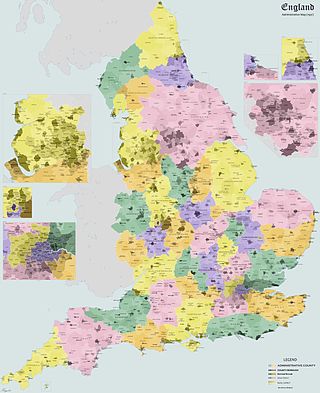
Municipal boroughs were a type of local government district which existed in England and Wales between 1835 and 1974, in Northern Ireland from 1840 to 1973 and in the Republic of Ireland from 1840 to 2002. Broadly similar structures existed in Scotland from 1833 to 1975 with the reform of royal burghs and creation of police burghs.

The Chicago City Council is the legislative branch of the government of the City of Chicago in Illinois. It consists of 50 alderpersons elected from 50 wards to serve four-year terms. The council is called into session regularly, usually monthly, to consider ordinances, orders, and resolutions whose subject matter includes code changes, utilities, taxes, and many other issues. The Chicago City Council Chambers are located in Chicago City Hall, as are the downtown offices of the individual alderpersons and staff.
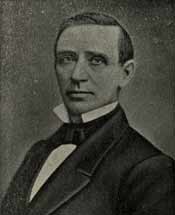
Francis Cornwall Sherman served as Mayor of Chicago, Illinois, for three terms as a member of the Democratic Party.
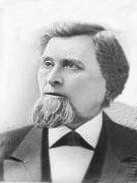
Monroe Heath was a U.S. politician. He served as Mayor of Chicago, Illinois (1876–1879) for the Republican Party, after winning the 1876 election. He was subsequently reelected the following year, defeating Perry H. Smith.

The Edmonton City Council is the governing body of the City of Edmonton, Alberta, Canada.
The Calgary City Council is the legislative governing body that represents the citizens of Calgary. The council consists of 15 members: the chief elected official, titled the mayor, and 14 councillors. Jyoti Gondek was elected mayor in October 2021 as the city's 37th. Each of the 14 councillors represent one of the city's 14 wards.
The Lethbridge City Council is the legislative governing body that represents the citizens of Lethbridge, Alberta. Eight councillors and the mayor comprise the council. The mayor is the city's chief elected official and the city manager is its chief administrative officer. For the 2017–2021 term, the mayor is Chris Spearman and the councillors are Mark Campbell, Jeff Carlson, Jeffrey Coffman, Belinda Crowson, Blaine Hyggen, Joseph Mauro, Rob Miyashiro, and Ryan Parker.
The Louisville Board of Aldermen was the legislative branch of government for the City of Louisville prior to its merger with Jefferson County in 2003. It comprised twelve wards.

James Bernard Bowler was an American politician from Chicago, Illinois. He served three terms as a United States Representative for Illinois. Elected at age 78, Bowler is the second oldest person to win his first election to Congress, after William Lewis of Kentucky.

The City of London is divided into 25 wards. The city is the historic core of the much wider metropolis of Greater London, with an ancient and sui generis form of local government, which avoided the many local government reforms elsewhere in the country in the 19th and 20th centuries. Unlike other modern English local authorities, the City of London Corporation has two council bodies: the now largely ceremonial Court of Aldermen, and the Court of Common Council.

The 4th Ward is one of the 50 aldermanic wards with representation in the City Council of Chicago, Illinois. It is broken into 52 election precincts. Lake Michigan is the ward's eastern boundary for much of its area. Its northwesternmost point, as of 2002, was located at the intersection of East 26th Street and South Prairie Avenue and its southeasternmost point at the intersection of East 55th Street and Lake Park Avenue.
Liverpool Town Council existed from 1835 to 1880.
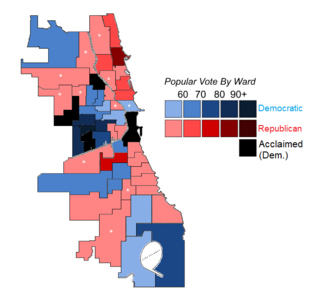
The 1929 Chicago aldermanic election was held on February 26, 1929, with a runoff on April 2, to elect the 50 members of the Chicago City Council. The elections were non-partisan. Held in the middle of mayor William Hale Thompson's term, it would be the penultimate midterm election; four-year terms for aldermen were adopted in 1935, coinciding with the mayoral election that year.

Dorsey Ryan Crowe was an American politician who served as alderman of Chicago's 21st ward from 1919 to 1923 and upon its redistricting into the 42nd ward from 1923 to his death. A Democrat serving most of the Near North Side, he represented such affluent constituencies as the Gold Coast and Streeterville as well as such poor areas as Cabrini–Green and Goose Island. At the time of his death he was the Dean of the Chicago City Council, as well as the last alderman from the era of partisan aldermanic elections and when wards elected two aldermen each. An alderman for 43 years, and the last to have served under a Republican mayor, he is as of 2018 the third-longest serving alderman in Chicago history, behind Ed Burke of the 14th ward and John Coughlin of the 1st.

Louis Bernard Anderson was an American politician who served as alderman of Chicago's 2nd ward from 1917 to 1933. A Republican, he served most of the Douglas community area, including much of the African-American neighborhood of Bronzeville. He was a prominent ally of mayor William Hale Thompson, and served as his floor leader throughout the 1920s.

the 1843 Chicago mayoral election , Democratic nominee Augustus Garrett defeated Whig nominee Thomas Church and Liberty nominee Henry Smith by a landslide 26.5% margin.
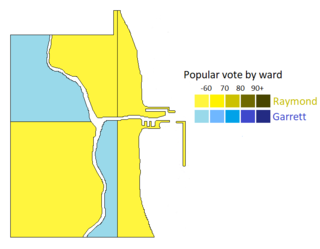
The 1842 Chicago Mayoral election Whig candidate and Former Mayor Benjamin Wright Raymond defeated Democratic candidate Augustus Garrett and Free Soil candidate Henry Smith by a six point margin.
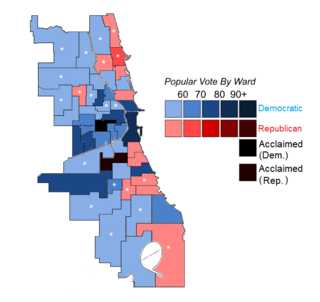
Elections to the Chicago City Council were held on February 27, 1923. Candidates ran as nonpartisans, and in elections where no candidate received the majority of votes a runoff election was held between the top two finishers on April 3, the same day as the election for Mayor.














